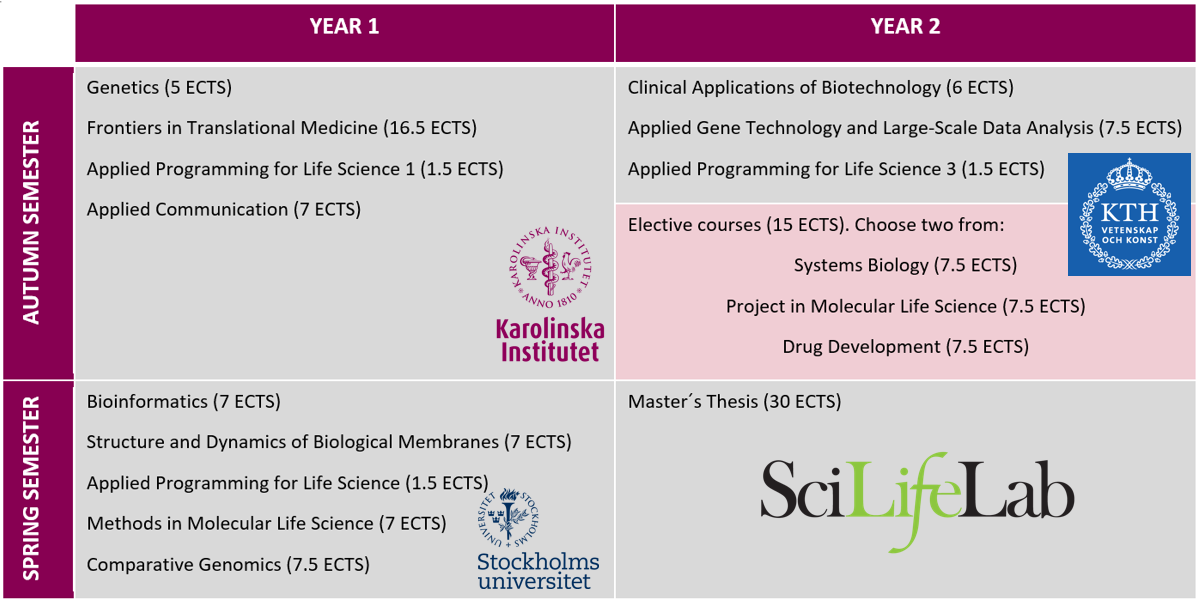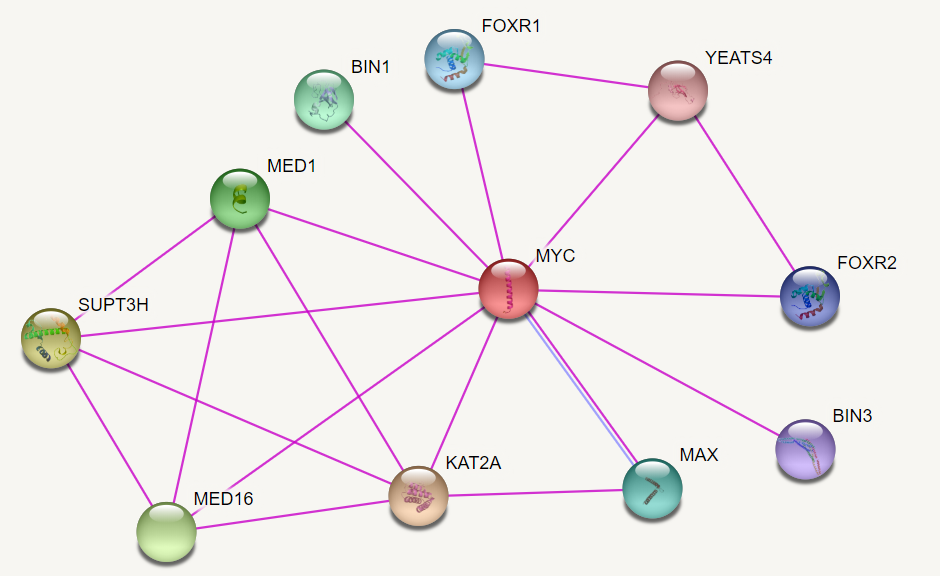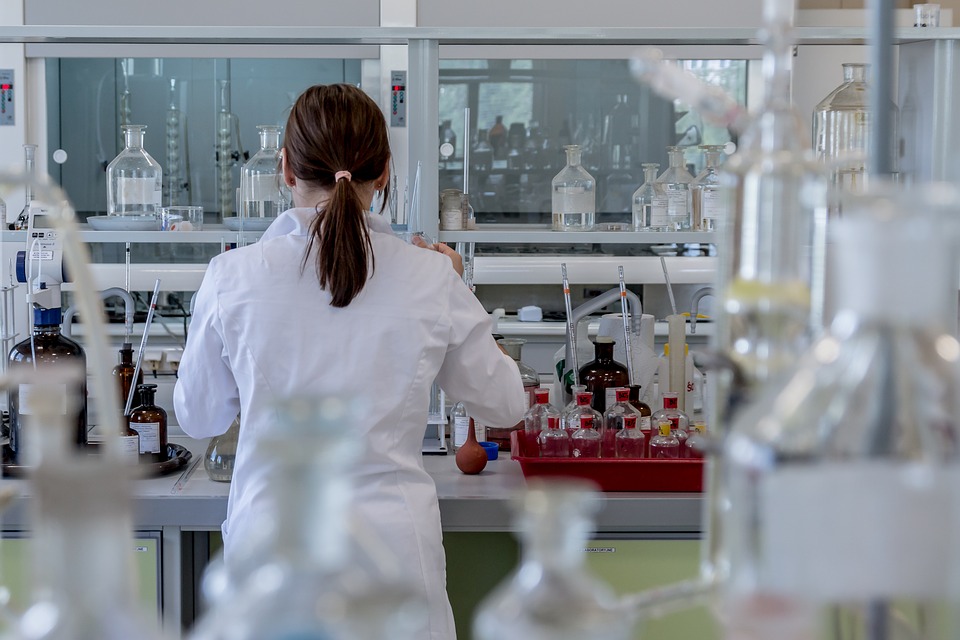
A Guide to the elective courses of the Molecular Techniques in Life Science Programme
As my second year in the Molecular Techniques in Life Science Joint Master Programme (MTLS) is approaching to its end, I thought it would be about time to give a review of the career choices that are available within this Programme. Being coordinated by three universities, the structure and courses of the MTLS Master’s are quite strict, and it only has three elective courses among which students have to chose two of them.
Recap: MTLS course structure
Before jumping into the MTLS elective courses and their content, I’m going to do a brief summary of the Programme’s structure. Keep in mind that the list of courses presented here are the ones valid for students starting on autumn 2020. If you want more information about how the future structure of the Programme would be I recommend you to contact the Programme Director, Olof Emanuelsson (olofem@kth.se).

Structure of the MTLS Programme for students starting in Autumn 2020
The MTLS Programme has a total of 120 ECTS, divided into two years with 60 ECTS each. The first year contains “traditional” courses (and I mean traditional in the sense of attending a course that is graded at the end, there are no internships or Master’s thesis in this semester). All courses in the first year, held at Karolinska Institutet and Stockholms Universitetet, are mandatory for all students. During the second year the Master’s structure is divided into two semesters. The autumn semester of the second year, also known as semester 3, is organised by KTH. Half of this period is made up by mandatory courses, and the other half is made up by the elective courses described below. Lastly, semester 4 is when the Master’s thesis takes place, which can be done at any of the three organising universities Karolinska Institutet, Stockholms Universitetet or KTH Royal Institute of Technology, as well as SciLifeLab or other research organisation elsewhere in the world.
The three elective courses in the MTLS Programme take place between mid/end of October and mid-January. They are all worth 7.5 ECTS and students have two select two out of the three of them. The elective courses are:
- Systems Biology (CB2030)
- Project in Molecular Life Science (CB2050)
- Drug Development (CB2090)
Elective course 1: Systems Biology (CB2030)
The Systems Biology course (CB2030) aims to give the students some background in basic concepts and methods used in systems biology. The course covers the following topics:
- Statistics
- Machine Learning
- Pathway and Network Biology
- Genome-Scale Metabolic Models
- Gene Regulation
- Integration of multiple types of omics data
The course contains both theoretical lectures as well as practical exercises in the computer lab, and it is graded by a final exam, the computer exercises and other activities (i.e. readings). Since I took this course, I will describe it in more detail in this course review.

Protein-Protein interaction network of the transcription factor MYC (Source:STRING)
Elective course 2: Project in Molecular Life Science (CB2050)
This is probably the most original elective course in the MTLS Programme, since it is a combination of a lab internship with lectures and training in project design and scientific communication.
I will describe my experience in the Project course (CB2050) in a more extended course review, but it basically contains two blocks:
- Lab internship: students look for or are assigned to a lab at any of the three universities or SciLifeLab, in which they perform a part-time research project (either individually or in pairs) that can be either wet lab-based, computer-based or a mix of both.
- Lectures and assignments: the project course also contains a series of lectures and assignments that are due every week and/or every couple of weeks. These cover topics in scientific communication, project time plan design and writing about the background and methods used in our projects.
The course is evaluated by combining all the assignments we have to submit throughout the course, as well as a final submission of a project report, final presentation of the project and the supervisor’s evaluation of our work.

The projects performed by the MTLS Students were wet lab-based, computer-based or a mix of both fields. Source: pxfuel.
Elective course 3: Drug Development (CB2090)
The Drug Development course (CB2090) aims to teach students how therapeutic drugs are designed and developed until their commercialisation. I have not taken this course, so all the information presented here comes from the KTH webpage.
This course covers all the process of drug design and development. Most lectures are given by invited speakers from both academia and the industry, who share their knowledge in topics such as:
- Basic pharmacology.
- Methods for drug target identification and validation.
- Methods for drug development and safety clinical trials.
- Drug commercialisation and intellectual property.
This course is graded by a final exam as well as a literature assignment.

The Drug Discovery and Development process
What do most students chose?
Usually MTLS students combine the project course with one of the theoretical ones, either Systems Biology or Drug Development. This offers a nice combination between theoretical and practical training, although these months can become super-intense depending on how ambitious your project plan is and how well you want to perform on the other course.
However, it is also the case that some students decided to take both theoretical courses. I can’t really speak about how busy or challenging the semester becomes in this case, since I have not experienced it, but it is definitely possible to do if you are interested.

There are some options when choosing the elective courses. It is always a good idea to talk to senior students for advice. Source: Pikrepo
I hope this post was useful to clarify how the elective courses work in the MTLS Programme. Don’t hesitate to contact me if you have any questions about the Programme, studies at Karolinska Institutet or life in Stockholm 😀
\Inés
email: ines.rivero.garcia@stud.ki.se
LinkedIn: Inés Rivero García

0 comments